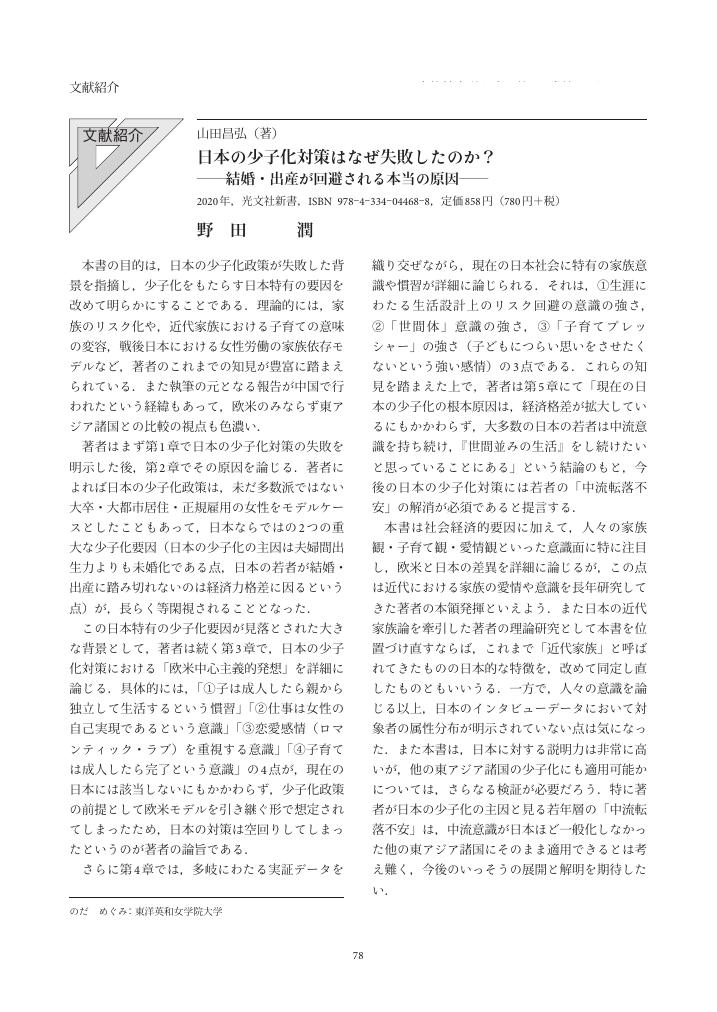- 著者
- 野田 潤
- 出版者
- 東洋英和女学院大学
- 雑誌
- 人文・社会科学論集 (ISSN:09157794)
- 巻号頁・発行日
- vol.39, pp.27-46, 2022-03
In the process of modernization of family in Japan, home cooking has been given a special value, and homemade meals became as a symbol of family love. As a result, even today, homemade meals by married women function strongly as a symbol of love. This may be one of the reasons why the excessive burden of housework put on women and the division of gender roles have not changed much when compared to other countries.This paper examines the origin of the norm in Japan that a wife should prepare extremely time-consuming homemade meals for her family in relation to modern family norms of affection, using text analysis.First, an analysis of articles from Yomiuri Shimbun (1874-2020) that included koshi-ben, aisai bento, and aijo bento in their headlines revealed that a strong connotation of between a homemade bento and affection was established in the mid-1960s to 1970 in Japan and has continued to the present day.Second, an analysis of articles on daily family food menus and recipes that appeared in Yomiuri Shimbun (1915-2020) shows that social standards for daily homemade meals in Japan rose sharply in the 1970s, and the menu consisting of one soup and three dishes became commonplace between the end of 1980s and the early 1990s. But it was also found that from the mid-1990s onward, there was a growing awareness of the need to shorten time and save labor when preparing meals.The above analyses reveal that the rapid rise of social standards for wives' homemade cooking went hand in hand with the emergence of the idea that a married woman's homemade cooking is a sign of her love for her family. This suggests that the deep-rooted tendency in Japan to view a wife's home-cooked meal as a proof of love is one of the reasons why wives have been slow to reduce their burden of housework, even today.
- 著者
- 野田 潤
- 出版者
- 日本家族社会学会
- 雑誌
- 家族社会学研究 (ISSN:0916328X)
- 巻号頁・発行日
- vol.33, no.1, pp.78, 2021-04-30 (Released:2021-05-26)
3 0 0 0 OA 「夫婦の不仲は親子の不仲」か 近代家族の情緒的関係についての語りの変容
- 著者
- 野田 潤
- 出版者
- 日本家族社会学会
- 雑誌
- 家族社会学研究 (ISSN:0916328X)
- 巻号頁・発行日
- vol.18, no.1, pp.17-26, 2006-07-31 (Released:2009-08-04)
- 参考文献数
- 10
- 被引用文献数
- 4 1
本稿は, 近代以降の夫婦関係と親子関係の接続についての人々の了解の形式の変容を明らかにし, 近代家族の情緒的関係の分節化を試みる。読売新聞の悩み相談欄「人生案内」 (1914~2003) の語りを分析した結果, 以下の知見が導かれた。 (1) 夫婦関係と子どもの幸福は1930年代までは無関係とされており, すべての語り手が子どものために頻繁に両親の夫婦仲を重視し始めるのは1970年代以降のことである。 (2) 夫婦関係と親子関係も1960年代までは別個に成立するものとされていたが, 1970年代後半以降, 人々は二つの間に因果関係を想定するようになっている。これらの知見からは, 近代家族の情緒的関係と現在ひとくくりに言われているものが, 近代以降でも変化していたことが明らかになった。なかでもとりわけ現在は, 家族内部の複数の異なる関係を, 容易に影響し合い連動し合うものだとみなし始めている点で, 特殊な時代だと言える。
- 著者
- 野田 潤也
- 出版者
- 日本食品微生物学会
- 雑誌
- 日本食品微生物学会雑誌 (ISSN:13408267)
- 巻号頁・発行日
- vol.24, no.1, pp.17-20, 2007
1 0 0 0 OA 下夷美幸(著)日本の家族と戸籍――なぜ「夫婦と未婚の子」単位なのか――
- 著者
- 野田 潤
- 出版者
- 日本家族社会学会
- 雑誌
- 家族社会学研究 (ISSN:0916328X)
- 巻号頁・発行日
- vol.32, no.2, pp.227-228, 2020-10-31 (Released:2021-05-25)
1 0 0 0 OA 書評
- 著者
- 野田 潤
- 出版者
- Japan Society of Family Sociology
- 雑誌
- 家族社会学研究 (ISSN:0916328X)
- 巻号頁・発行日
- vol.18, no.1, pp.17-26, 2006
- 被引用文献数
- 1
本稿は, 近代以降の夫婦関係と親子関係の接続についての人々の了解の形式の変容を明らかにし, 近代家族の情緒的関係の分節化を試みる。読売新聞の悩み相談欄「人生案内」 (1914~2003) の語りを分析した結果, 以下の知見が導かれた。 (1) 夫婦関係と子どもの幸福は1930年代までは無関係とされており, すべての語り手が子どものために頻繁に両親の夫婦仲を重視し始めるのは1970年代以降のことである。 (2) 夫婦関係と親子関係も1960年代までは別個に成立するものとされていたが, 1970年代後半以降, 人々は二つの間に因果関係を想定するようになっている。これらの知見からは, 近代家族の情緒的関係と現在ひとくくりに言われているものが, 近代以降でも変化していたことが明らかになった。なかでもとりわけ現在は, 家族内部の複数の異なる関係を, 容易に影響し合い連動し合うものだとみなし始めている点で, 特殊な時代だと言える。
- 著者
- 野田 潤
- 出版者
- Japan Society of Family Sociology
- 雑誌
- 家族社会学研究 (ISSN:0916328X)
- 巻号頁・発行日
- vol.20, no.2, pp.48-59, 2008
- 被引用文献数
- 3
近年,個人の選択性の増大や家族の拘束性の減少を意味する「家族の個人化」の進行が指摘され,増加する離婚率はその証左と見なされてきた。しかし子どもの存在を分析枠組に入れて新聞の離婚相談欄を研究した本稿からは,異なる知見が導かれた。まず,離婚したいという夫や妻個人の希望の正当性を,子どもという夫婦以外の第三者の都合から審査する傾向は,相談者の間では1930年代以降,2000年代の現在においても全く減少していない。次に,「あなたのための離婚」と述べて個人の選択権の増大を強調する1980年代以降に特徴的な回答者の言説は,実は「あなたのため」が「子のため」を阻害しないという前提のもとでしか語られていない。つまり夫婦の離婚は子どもという拘束からは自由になったとは言い切れないのである。このように本稿は子どもを分析枠組に入れることで,個人化とは矛盾する現代家族の一側面を明らかにした。
1 0 0 0 OA 「子どものため」という語りから見た家族の個人化の検討
- 著者
- 野田 潤
- 出版者
- 日本家族社会学会
- 雑誌
- 家族社会学研究 (ISSN:0916328X)
- 巻号頁・発行日
- vol.20, no.2, pp.2_48-2_59, 2008-10-31 (Released:2009-11-20)
- 参考文献数
- 27
- 被引用文献数
- 2 3
近年,個人の選択性の増大や家族の拘束性の減少を意味する「家族の個人化」の進行が指摘され,増加する離婚率はその証左と見なされてきた。しかし子どもの存在を分析枠組に入れて新聞の離婚相談欄を研究した本稿からは,異なる知見が導かれた。まず,離婚したいという夫や妻個人の希望の正当性を,子どもという夫婦以外の第三者の都合から審査する傾向は,相談者の間では1930年代以降,2000年代の現在においても全く減少していない。次に,「あなたのための離婚」と述べて個人の選択権の増大を強調する1980年代以降に特徴的な回答者の言説は,実は「あなたのため」が「子のため」を阻害しないという前提のもとでしか語られていない。つまり夫婦の離婚は子どもという拘束からは自由になったとは言い切れないのである。このように本稿は子どもを分析枠組に入れることで,個人化とは矛盾する現代家族の一側面を明らかにした。


